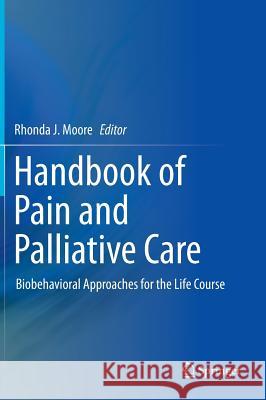Handbook of Pain and Palliative Care: Biobehavioral Approaches for the Life Course » książka
Handbook of Pain and Palliative Care: Biobehavioral Approaches for the Life Course
ISBN-13: 9781441916501 / Angielski / Twarda / 2012 / 865 str.
Handbook of Pain and Palliative Care: Biobehavioral Approaches for the Life Course Rhonda J. Moore, editor This book takes both a biobehavioral and a lifespan approach to understanding long-term and chronic pain, and intervening to optimize patients functioning. Rich in clinical diversity, chapters explore emerging areas of interest (computer-based interventions, fibromyalgia, stress), ongoing concerns (cancer pain, low back pain), and special populations (pediatric, elderly, military). This coverage provides readers with a knowledge base in assessment, treatment, and management that is up to date, practice strengthening, and forward looking. Subject areas featured in the Handbook include: Patient-practitioner communication Assessment tools and strategies Common pain conditions across the lifespan Biobehavioral mechanisms of chronic pain Pharmaceutical, neurological, and rehabilitative interventions Psychosocial, complementary/alternative, narrative, and spiritual approaches Ethical issue and future directionsWith the rise of integrative perspective and the emphasis on overall quality of life rather than discrete symptoms, pain management is gaining importance across medical disciplines. Handbook of Pain and Palliative Care stands out as a one-stop reference for a range of professionals, including health practitioners specializing in pain management or palliative care, clinical and health psychologists, public health professionals, and clinicians and administrators in long-term care and hospice."
Pain has long been regarded as an unpleasant sensory consequence of neuronal activity in specific nociceptive pathways that is triggered by noxious stimuli, inflammation, or damage to the nervous system structure or function. However, classic models of disease and pain mechanisms do not adequately explain the commonly observed discrepancies between the extent of pathology levels of reported pain, the impact of experience of illness, disability, or in certain instances death, on the lived experience of pain. In other words, pain is not only a sensory event but a biobehavioral event as well. As such, it is subjective and therefore a significant cause of psychological suffering and even existential questioning. Thus treatment for many chronic pain syndromes, early in life, over the life course, and certainly at the end of life, remains an inexact science. §Recent studies over the past decade have begun to explore a biobehavioral approach, one that considers the interactive role of biological, environmental, emotional, existential, and psychosocial processes that can adversely impact the development, course, and experience of illness and disease over the life course. Illness is defined as the subjective experience of a disease or disorder. In contrast, disease is defined as an objective biological event involving the disruption of specific body structures or organ systems. The central goal of palliative care is to prevent and relieve suffering and to enable the best quality of life possible for patients, their families or significant others, no matter what the stage of the disorder, the need for other treatments, or the setting in which care is delivered. Thus, better palliative care services are one potential response that could alleviate some of the more challenging concerns associated with chronic pain. This is because palliative care focuses on patients of all ages with a chronic disorder whether an illness, condition, or injury that adversely impact daily functioning or reduces life expectancy. For such individuals, having access to early palliative care represents an opportunity to maintain the hopes of avoiding undue toxicity and fulfilling whatever tasks are important as they live their life or approach the end of life. Yet despite an increasing need for palliative care for patients with a variety of chronic conditions, such as musculoskeletal pain and cancer, individuals are often referred too late to receive the benefit of palliative care services. Moreover, limited research exists in which adequately provides a sufficient understanding of the biobehavioral approaches and mechanisms that can enhance palliative care practice and quality of care outcomes.§











